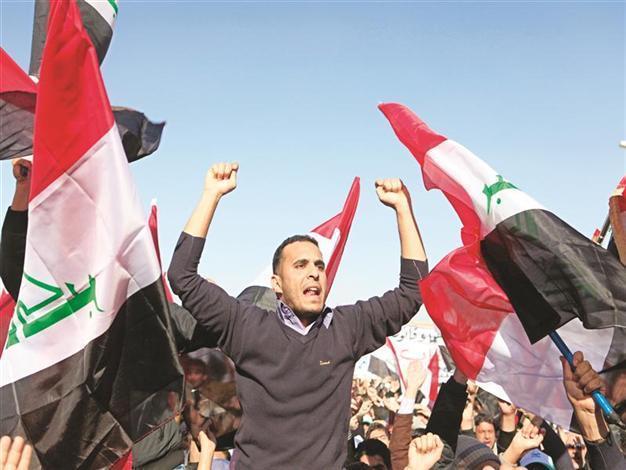Iraq is now orphaned: Shiite cleric
ARBIL / BAGHDAD

Protesters chant slogans against Iraq’s Shiite-led government. Iraqi Shiite leader al-Sadr has advised the PM to directly meet with protesters. AP photo
Iraq has been left much like a fatherless orphan because it has been deprived of a president capable of listening to problems and conducting mediation, one of the country’s top Shiite leaders said yesterday.
“If the problem of the presidency is not resolved, the dictatorship will spread to the presidency from the prime ministry, and this would make the situation worse and more problematic. Iraq is like a son without a father because it does not have its president who deals with problems and mediates,” influential Shiite figure Muqtada al-Sadr said in reference to the absence of President Jalal Talabani, who suffered a stroke last month and was flown to Germany for treatment.
His ailing health has raised concerns about his political future while also tipping off a new crisis in Iraq. The crisis has been worsened by weeks of demonstrations against Prime Minister Nouri al-Maliki’s rule in mostly-Sunni areas, with protesters alleging that the premier has misused anti-terror laws to wrongfully detain members of their community.
Al-Maliki has threatened to direct security forces to intervene in the protests, which were sparked by the Dec. 20, 2012, arrest of at least nine guards of Sunni Finance Minister Rafa al-Essawi.
Meanwhile, Iraq has freed 335 inmates in the past week, a top minister said yesterday while apologizing to detainees held without charge, part of efforts to curb weeks of rallies. Justice Ministry officials released 178 inmates yesterday, spokesman Haidar al-Saadi said, bringing to 335 the number of detainees freed in the past week, according to Deputy Prime Minister Hussein al-Shahristani.
“I apologize in the name of the Iraqi state for any of you who were arrested and kept for this period of time, and it seems later that you are innocent,” Shahristani said. Amid the ongoing crisis, al-Essawi escaped an apparent assassination attempt on Jan. 13 when his convoy was struck by a roadside bomb. The minister’s convoy had been traveling between the towns of Fallujah and Abu Ghraib, west of Baghdad, when the bomb went off, two security officials said. No one in al-Essawi’s entourage was harmed, but some of the vehicles were damaged, the officials said.
